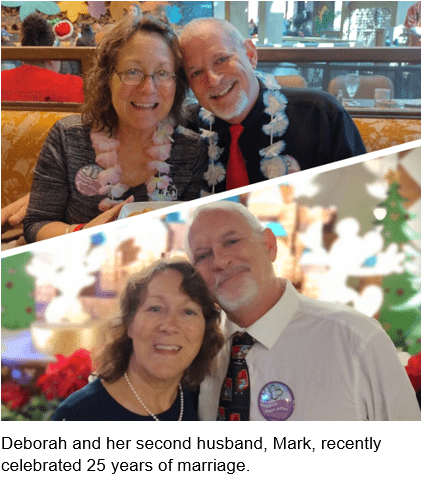Though she just celebrated 25 years of marriage with her husband, Mark, surrounded by her three sons and their families in Disney World, Deborah still can’t go into a completely dark room.
The fear stems from an evening more than 30 years ago when, after turning off the lights in the bedroom, her first husband pushed Deborah inside, slammed the door closed, and screamed at her until she managed to escape through a window. As she attempted to run barefoot to a neighbor’s house for help, he grabbed her and dragged her back into the house.
 Deborah met the man who would become her first husband when she was 19 and working two part-time jobs in southern Indiana, including one at a fast food restaurant where he was a manager. The couple dated for a year, and Deborah didn’t notice any red flags until after they married. The newlyweds went to a movie, and when something in the film upset her husband, he began screaming and swung at her. She didn’t know it at the time, but he was high – and had a long history of drug abuse.
Deborah met the man who would become her first husband when she was 19 and working two part-time jobs in southern Indiana, including one at a fast food restaurant where he was a manager. The couple dated for a year, and Deborah didn’t notice any red flags until after they married. The newlyweds went to a movie, and when something in the film upset her husband, he began screaming and swung at her. She didn’t know it at the time, but he was high – and had a long history of drug abuse.
Her husband started bringing other users to their apartment, and she hid under the bed to avoid seeing or knowing what was happening.
“His cousin told me he could control his behavior and be a good person, but he chose not to after we were married because he knew I was trapped,” said Deborah. “I was a devout Roman Catholic and believed deeply in those vows and in staying together. He was from a great family, but they viewed our marriage as me taking him off their hands, like it was a relief that someone else could deal with him.”
It wasn’t long before she began considering whether she could get an annulment, but the couple soon moved to Nebraska for her husband’s job and she was whisked away from family and friends – a critical support network.
Like a lot of women, I thought if we had a baby, he might calm down and get better,” Deborah said. “But my first pregnancy ended in miscarriage when he got mad and punched me in the abdomen. And even after I had my first son, it did not get much better.”
The family moved to Florida, where her husband got clean and found assistance for his neurological disorders. When they welcomed their third child, her husband proposed returning to Indiana to get help from their families. Plunged back into familiar surroundings and relationships, old behaviors slowly returned.
Her husband started throwing things, punching holes in the walls, and screaming as loud as he could into her ears. In one incident, Deborah kidney-punched him to stop him from shaking one of their sons, screaming for the child to run and hide. As he slid under the bed, she thought to herself, “I know what that’s like.”
A turning point came when, during an argument, he forbid her to teach anything about Jesus in their house.
“I told him, ‘You will have to kill me to stop me,’” said Deborah. “Then I prayed for someone to save my kids.”
He came towards Deborah as if to hit her but suddenly stopped. His eyes widened and he backed up, grabbed his keys, and ran.
“There must have been an angel behind me, because I don’t know why he ran,” said Deborah.
As she made the decision to leave her marriage, she contacted The Center for Women and Families. At their office, she told her husband—with witnesses present—that she wanted a divorce. Advocates from The Center and Metro United Way accompanied her to court appearances, and she was granted the house, kids, and car. Deborah enrolled in nursing school and earned a medical assistant certification in 18 months so she could support her family as a newly single mother.
Other women have that conversation with their partners about leaving and don’t survive,” said Deborah. “You have to be strategic to get out and survive. Then you find out what you’re really worth and how far you can fly. Once I got out from under that relationship, I found out how smart I really was.”
Deborah was a patient care advocate for 11 years and began a writing career in 2008 that has resulted in more than 20 books published (and counting). She remarried in 1997 when her sons were 13, 10, and 8.
“If my life shows one thing, it’s how to survive,” said Deborah. “You have to keep breathing, and find somewhere to believe in yourself and know that everything you’ve been fed and every hateful thought that’s come against you is a lie, because God made you holy and perfect.”







